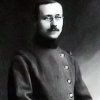Max Stirner

Max Stirner
Johann Kaspar Schmidt, better known as Max Stirner, was a German philosopher. He is often seen as one of the forerunners of nihilism, existentialism, psychoanalytic theory, postmodernism, and anarchism, especially of individualist anarchism. Stirner's main work is The Ego and Its Own, also known as The Ego and His Own. This work was first published in 1845 in Leipzig, and has since appeared in numerous editions and translations...
NationalityGerman
ProfessionPhilosopher
Date of Birth25 October 1806
CountryGermany
The man is distinguished from the youth by the fact that he takes the world as it is, instead of everywhere fancying it amiss and wanting to improve it, i.e. model it after his ideal; in him the view that one must deal with the world according to his interest, not according to his ideals, becomes confirmed.
Christianity has aimed to deliver us from a life determined by nature, from the appetites as actuating us, and so has meant that man should not let himself be determined by his appetites.
Spiritual men have taken into their head something that is to be realized. They have concepts of love, goodness, and the like, which they would like to see realized; therefore they want to set up a kingdom of love on earth, in which no one any longer acts from selfishness, but each one 'from love.' Love is to rule.
Man, your head is haunted; you have wheels in your head! You imagine great things, and depict to yourself a whole world of gods that has an existence for you, a spirit-realm to which you suppose yourself to be called, an ideal that beckons to you. You have a fixed idea!
The moral man is necessarily narrow in that he knows no other enemy than the 'immoral' man. 'He who is not moral is immoral!' and accordingly reprobate, despicable, etc. Therefore, the moral man can never comprehend the egoist.
Protestantism has actually put a man in the position of a country governed by secret police. The spy and eavesdropper, 'conscience,' watches over every motion of the mind, and all thought and action is for it a 'matter of conscience,' i.e. police business.
Before the sacred, people lose all sense of power and all confidence; they occupy a powerless and humble attitude toward it. And yet no thing is sacred of itself, but by my declaring it sacred, by my declaration, my judgment, my bending the knee; in short, by my - conscience.
Many a man renounces morals, but with great difficulty the conception, 'morality.' Morality is the 'idea' of morals, their intellectual power, their power over the conscience; on the other hand, morals are too material to rule the mind, and do not fetter an 'intellectual' man, a so-called independent, a 'freethinker.'
Before the sacred, people lost all sense of power and all confidence; they occupy a powerless and humble attitude toward it. And yet no thing is sacred of itself, but by declaring it sacred, by my declaration, my judgment, my bending the knee; in short, by my - conscience.
He who is infatuated with 'Man' leaves persons out of account so far as that infatuation extends, and floats in an ideal, sacred interest. Man, you see, is not a person, but an ideal, a spook.
Now why, if freedom is striven after for love of the I after all - why not choose the I himself as beginning, middle, and end?
What matters the party to me? I shall find enough anyhow who unite with me without swearing allegiance to my flag.
No knowledge, however thorough and extensive, no brilliance and perspicuity, no dialectic sophistication, will preserve us from the commmonness of thought and will. It is truly not the merit of the school if we do not come out selfish.
In crime the egoist has hitherto asserted himself and mocked at the sacred; the break with the sacred, or rather of the sacred, may become general. A revolution never returns, but an immense, reckless, shameless, conscienceless, proud—crime, doesn't it rumble in the distant thunder, and don't you see how the sky grows ominously silent and gloomy?